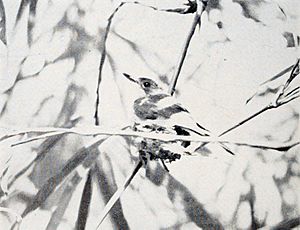Guam flycatcher facts for kids
The Guam flycatcher (Myiagra freycineti), also called the Guam broadbill, was a small bird that used to live only on the island of Guam. Sadly, this bird is now extinct, meaning there are no more of them left in the world. It belonged to a bird family called Monarchidae.
Quick facts for kids Guam flycatcher/ Guam broadbill |
|
|---|---|
 |
|
| Specimen in Mount Santa Rosa | |
| Conservation status | |
| Scientific classification |
|
| Kingdom: | Animalia |
| Phylum: | Chordata |
| Class: | Aves |
| Order: | Passeriformes |
| Family: | Monarchidae |
| Genus: | Myiagra |
| Species: |
†M. freycineti
|
| Binomial name | |
| †Myiagra freycineti Oustalet, 1881
|
|
| Script error: The function "autoWithCaption" does not exist. | |
| Synonyms | |
|
|
Script error: No such module "Check for conflicting parameters".
About Its Name
Scientists group living things into families. The Guam flycatcher was sometimes thought to be a type of Oceanic flycatcher. It was also linked to the Pohnpei flycatcher and Palau flycatcher.
This bird had a few other names too. People sometimes called it the Guam Myiagra or Micronesian broadbill. These names help scientists keep track of different species.
What Did It Look Like?
The Guam flycatcher was a small bird. It was about 5 inches (13 cm) long. Male and female birds looked different.
Male Guam flycatchers had shiny blue-black feathers on their backs. Female birds were brownish-gray on their backs. Both males and females had white feathers on their undersides. They also had a light tan color on their chests.
The bird had a wide beak. It also had long "whiskers" near its mouth. These whiskers helped the bird find its food.
Why Did It Disappear?
The Guam flycatcher was a shy bird. It mostly lived in forests with limestone rocks and deep ravines. In the early 1970s, this bird was common on Guam.
However, its population quickly dropped. This was because of a new animal on the island. The brown tree snake (Boiga irregularis) was accidentally brought to Guam in the 1940s.
These snakes hunted and ate the birds. The last time anyone saw a Guam flycatcher was in 1983. This sighting was in the Santa Rosa area of Guam.
Guam is a small island. The brown tree snake is now found everywhere the flycatcher used to live. Because of this, the Guam flycatcher is now considered extinct.
See also
 In Spanish: Monarca de Guam para niños
In Spanish: Monarca de Guam para niños
 | Aurelia Browder |
 | Nannie Helen Burroughs |
 | Michelle Alexander |


